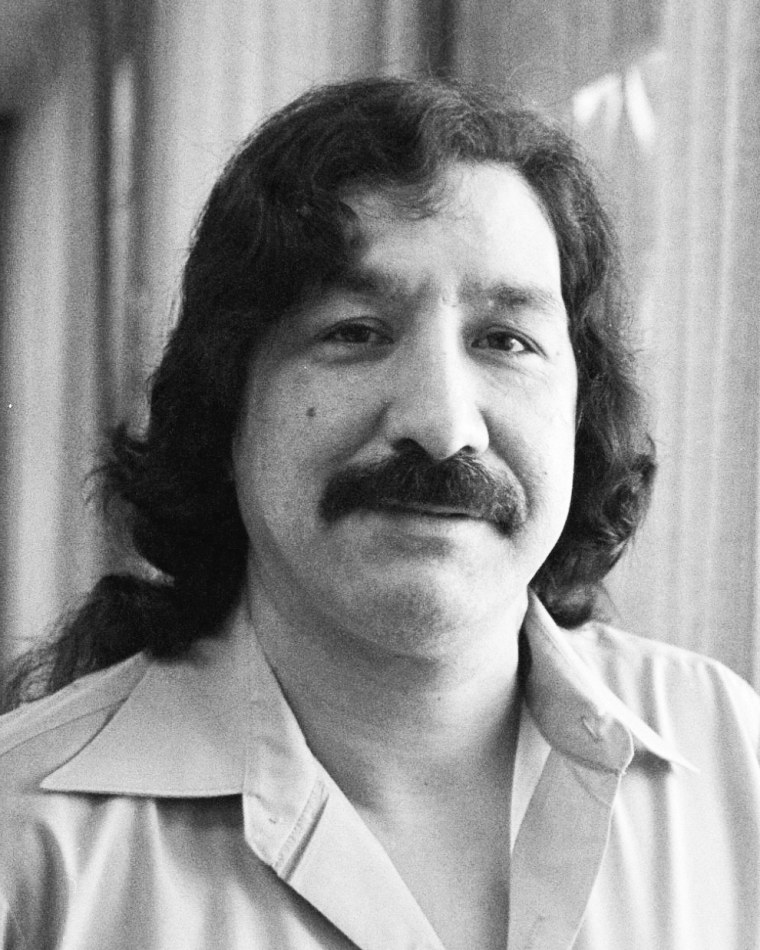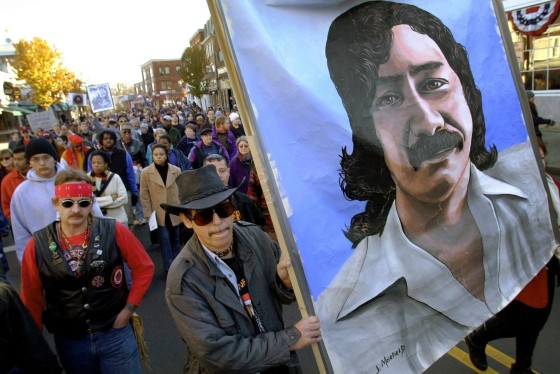The U.S. Parole Commission has denied Leonard Peltier's bid for parole, his lawyer said Tuesday, another setback in freeing Peltier, the ailing Indigenous rights activist who has long maintained his innocence in the killing of two FBI agents almost 50 years ago.
Peltier, 79, made a case for parole based on several factors, including his age, his nonviolent record in prison and his declining health, which has been affected by diabetes, hypertension, partial blindness from a stroke and bouts of Covid.
Ahead of Peltier's hearing on June 10, his lawyer, Kevin Sharp, had acknowledged that the request was "probably his last chance" to make a case for parole, because Peltier's last full hearing was 15 years ago. Sharp said Tuesday that an interim hearing about Peltier's parole status has been set for 2026, with a full hearing scheduled for June 2039, when he would be 94.
He added that the commission recommended that the federal Bureau of Prisons review Peltier's medical records and assess whether he should be transferred to a medical facility the agency operates.
Sharp plans to appeal the commission’s decision.
"Today's announcement continues the injustice of this long ordeal for Leonard Peltier," Sharp said. "This decision is a missed opportunity for the United States to finally recognize the misconduct of the FBI and send a message to Indian Country regarding the impacts of the federal government's actions and policies of the 1970s."
While Peltier's case has drawn support from prominent human rights groups, faith leaders and members of Congress over the decades, his requests for both parole and presidential clemency have been long shots in getting released early from prison, given the circumstances of the crime and the staunch opposition from law enforcement officials.

Peltier is serving two consecutive life sentences at a federal prison in Florida for the fatal shootings of FBI agents Jack Coler and Ron Williams. He remains eligible for parole because he was convicted before November 1987, when new sentencing guidelines went into effect.
FBI Director Christopher Wray praised the Parole Commission's decision, saying in a statement Tuesday that Peltier "has been afforded his rights and due process time and again, and repeatedly, the weight of the evidence has supported his conviction and his life sentence."
Natalie Bara, president of the FBI Agents Association, which advocates for active and retired agents, also applauded the Parole Commission's decision.
"Activists sympathetic to Peltier attempted to mislead the Commission and the public to secure release of this unremorseful murderer of FBI Special Agents Jack Coler and Ronald Williams," Bara said in a statement, adding that the association "will continue to counter these efforts, and we stand with the entire FBI family in our determination to ensure that Peltier serves his full sentence."
But there has long been scrutiny surrounding how Peltier's case was investigated and his trial was conducted.
On June 26, 1975, Coler and Williams were on the Pine Ridge Indian Reservation in South Dakota to arrest a man on a federal warrant in connection with the theft of cowboy boots, according to the agency's investigative files.
While they were there, the agents radioed that they had come under fire in a shootout that lasted 10 minutes, the FBI said. Both men were fatally shot at close range. According to the officials, Peltier — a member of the Turtle Mountain Band of Chippewa Indians and then an activist with the American Indian Movement, a grassroots Indigenous rights group — was identified as the only person on the reservation in possession of the type of weapon that could fire the type of bullet that killed the agents.
But dozens of people had participated in the gunfight; at trial, two co-defendants were acquitted after they claimed self-defense. When Peltier was tried separately in 1977, no witnesses who could identify him as the shooter were presented, and unknown to his defense lawyers at the time, the federal government had withheld a ballistics report indicating the fatal bullets didn't come from his weapon, according to court documents Peltier filed on appeal.
But the FBI has maintained his conviction was "rightly and fairly obtained" and "has withstood numerous appeals to multiple courts, including the U.S. Supreme Court."
Native American rights groups and tribal leaders say Peltier's conviction was emblematic of the struggle between Native Americans and the federal government, particularly on Indigenous lands, and the events at Pine Ridge have long rankled Indigenous activists who say the killing of a Native American man in the shootout with the federal agents was never formally investigated.
Nick Tilsen, president and CEO of NDN Collective, an Indigenous-led advocacy organization, said Peltier's latest denial for parole is a "sad day for Indigenous Peoples and justice everywhere."
"While we are heartbroken by the parole commission's decision," he said in a statement, "our work to ensure that Leonard will receive justice and freedom will continue with renewed dedication."

